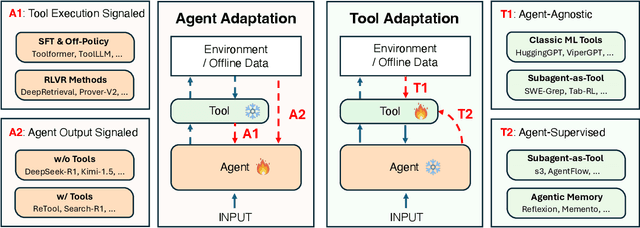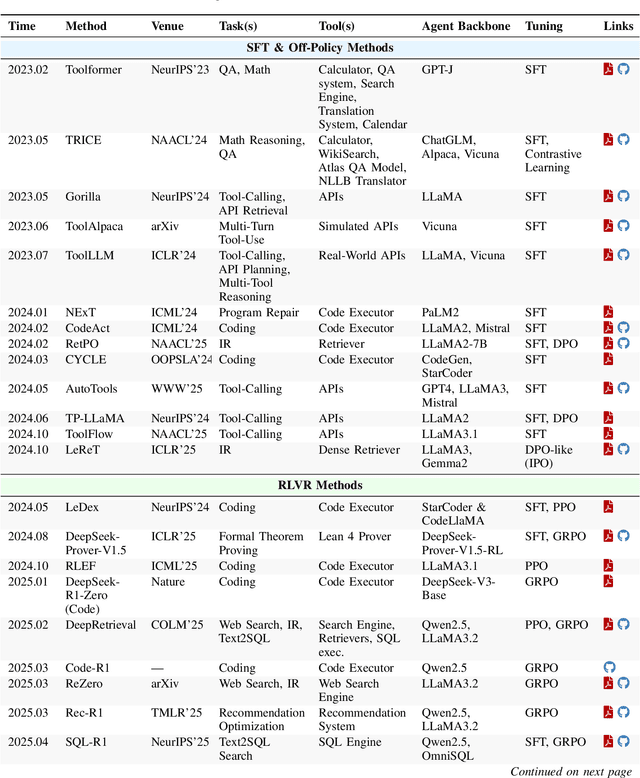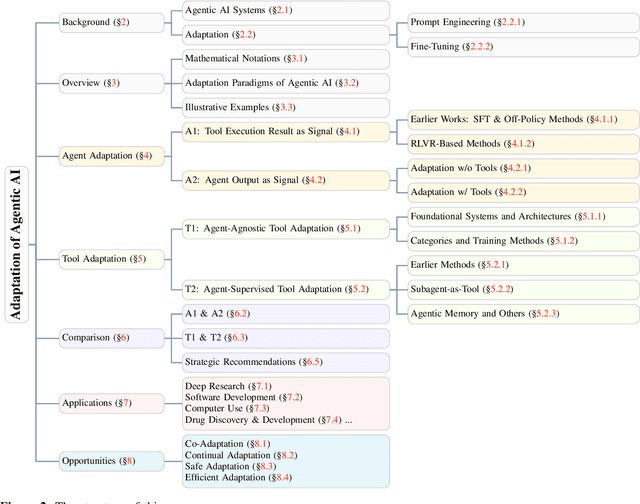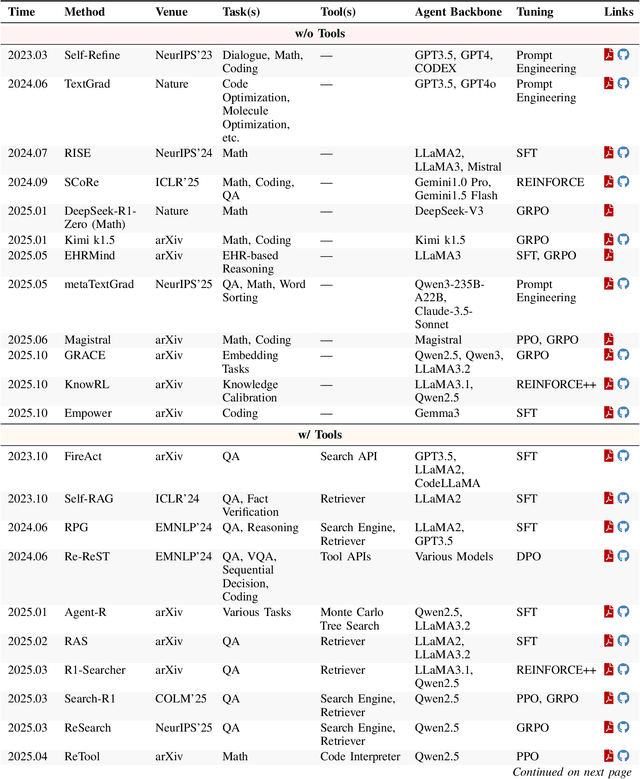Xueqiang Xu
Steer2Adapt: Dynamically Composing Steering Vectors Elicits Efficient Adaptation of LLMs
Feb 07, 2026Abstract:Activation steering has emerged as a promising approach for efficiently adapting large language models (LLMs) to downstream behaviors. However, most existing steering methods rely on a single static direction per task or concept, making them inflexible under task variation and inadequate for complex tasks that require multiple coordinated capabilities. To address this limitation, we propose STEER2ADAPT, a lightweight framework that adapts LLMs by composing steering vectors rather than learning new ones from scratch. In many domains (e.g., reasoning or safety), tasks share a small set of underlying concept dimensions. STEER2ADAPT captures these dimensions as a reusable, low-dimensional semantic prior subspace, and adapts to new tasks by dynamically discovering a linear combination of basis vectors from only a handful of examples. Experiments across 9 tasks and 3 models in both reasoning and safety domains demonstrate the effectiveness of STEER2ADAPT, achieving an average improvement of 8.2%. Extensive analyses further show that STEER2ADAPT is a data-efficient, stable, and transparent inference-time adaptation method for LLMs.
Rethinking the Reranker: Boundary-Aware Evidence Selection for Robust Retrieval-Augmented Generation
Feb 03, 2026Abstract:Retrieval-Augmented Generation (RAG) systems remain brittle under realistic retrieval noise, even when the required evidence appears in the top-K results. A key reason is that retrievers and rerankers optimize solely for relevance, often selecting either trivial, answer-revealing passages or evidence that lacks the critical information required to answer the question, without considering whether the evidence is suitable for the generator. We propose BAR-RAG, which reframes the reranker as a boundary-aware evidence selector that targets the generator's Goldilocks Zone -- evidence that is neither trivially easy nor fundamentally unanswerable for the generator, but is challenging yet sufficient for inference and thus provides the strongest learning signal. BAR-RAG trains the selector with reinforcement learning using generator feedback, and adopts a two-stage pipeline that fine-tunes the generator under the induced evidence distribution to mitigate the distribution mismatch between training and inference. Experiments on knowledge-intensive question answering benchmarks show that BAR-RAG consistently improves end-to-end performance under noisy retrieval, achieving an average gain of 10.3 percent over strong RAG and reranking baselines while substantially improving robustness. Code is publicly avaliable at https://github.com/GasolSun36/BAR-RAG.
Adaptation of Agentic AI
Dec 22, 2025



Abstract:Cutting-edge agentic AI systems are built on foundation models that can be adapted to plan, reason, and interact with external tools to perform increasingly complex and specialized tasks. As these systems grow in capability and scope, adaptation becomes a central mechanism for improving performance, reliability, and generalization. In this paper, we unify the rapidly expanding research landscape into a systematic framework that spans both agent adaptations and tool adaptations. We further decompose these into tool-execution-signaled and agent-output-signaled forms of agent adaptation, as well as agent-agnostic and agent-supervised forms of tool adaptation. We demonstrate that this framework helps clarify the design space of adaptation strategies in agentic AI, makes their trade-offs explicit, and provides practical guidance for selecting or switching among strategies during system design. We then review the representative approaches in each category, analyze their strengths and limitations, and highlight key open challenges and future opportunities. Overall, this paper aims to offer a conceptual foundation and practical roadmap for researchers and practitioners seeking to build more capable, efficient, and reliable agentic AI systems.
Finish First, Perfect Later: Test-Time Token-Level Cross-Validation for Diffusion Large Language Models
Oct 06, 2025



Abstract:Diffusion large language models (dLLMs) have recently emerged as a promising alternative to autoregressive (AR) models, offering advantages such as accelerated parallel decoding and bidirectional context modeling. However, the vanilla decoding strategy in discrete dLLMs suffers from a critical limitation: once a token is accepted, it can no longer be revised in subsequent steps. As a result, early mistakes persist across iterations, harming both intermediate predictions and final output quality. To address this issue, we propose Tolerator (Token-Level Cross-Validation Refinement), a training-free decoding strategy that leverages cross-validation among predicted tokens. Unlike existing methods that follow a single progressive unmasking procedure, Tolerator introduces a two-stage process: (i) sequence fill-up and (ii) iterative refinement by remasking and decoding a subset of tokens while treating the remaining as context. This design enables previously accepted tokens to be reconsidered and corrected when necessary, leading to more reliable diffusion decoding outputs. We evaluate Tolerator on five standard benchmarks covering language understanding, code generation, and mathematics. Experiments show that our method achieves consistent improvements over the baselines under the same computational budget. These findings suggest that decoding algorithms are crucial to realizing the full potential of diffusion large language models. Code and data are publicly available.
Zero-Shot Open-Schema Entity Structure Discovery
Jun 04, 2025Abstract:Entity structure extraction, which aims to extract entities and their associated attribute-value structures from text, is an essential task for text understanding and knowledge graph construction. Existing methods based on large language models (LLMs) typically rely heavily on predefined entity attribute schemas or annotated datasets, often leading to incomplete extraction results. To address these challenges, we introduce Zero-Shot Open-schema Entity Structure Discovery (ZOES), a novel approach to entity structure extraction that does not require any schema or annotated samples. ZOES operates via a principled mechanism of enrichment, refinement, and unification, based on the insight that an entity and its associated structure are mutually reinforcing. Experiments demonstrate that ZOES consistently enhances LLMs' ability to extract more complete entity structures across three different domains, showcasing both the effectiveness and generalizability of the method. These findings suggest that such an enrichment, refinement, and unification mechanism may serve as a principled approach to improving the quality of LLM-based entity structure discovery in various scenarios.
LogiCoL: Logically-Informed Contrastive Learning for Set-based Dense Retrieval
May 26, 2025Abstract:While significant progress has been made with dual- and bi-encoder dense retrievers, they often struggle on queries with logical connectives, a use case that is often overlooked yet important in downstream applications. Current dense retrievers struggle with such queries, such that the retrieved results do not respect the logical constraints implied in the queries. To address this challenge, we introduce LogiCoL, a logically-informed contrastive learning objective for dense retrievers. LogiCoL builds upon in-batch supervised contrastive learning, and learns dense retrievers to respect the subset and mutually-exclusive set relation between query results via two sets of soft constraints expressed via t-norm in the learning objective. We evaluate the effectiveness of LogiCoL on the task of entity retrieval, where the model is expected to retrieve a set of entities in Wikipedia that satisfy the implicit logical constraints in the query. We show that models trained with LogiCoL yield improvement both in terms of retrieval performance and logical consistency in the results. We provide detailed analysis and insights to uncover why queries with logical connectives are challenging for dense retrievers and why LogiCoL is most effective.
s3: You Don't Need That Much Data to Train a Search Agent via RL
May 20, 2025Abstract:Retrieval-augmented generation (RAG) systems empower large language models (LLMs) to access external knowledge during inference. Recent advances have enabled LLMs to act as search agents via reinforcement learning (RL), improving information acquisition through multi-turn interactions with retrieval engines. However, existing approaches either optimize retrieval using search-only metrics (e.g., NDCG) that ignore downstream utility or fine-tune the entire LLM to jointly reason and retrieve-entangling retrieval with generation and limiting the real search utility and compatibility with frozen or proprietary models. In this work, we propose s3, a lightweight, model-agnostic framework that decouples the searcher from the generator and trains the searcher using a Gain Beyond RAG reward: the improvement in generation accuracy over naive RAG. s3 requires only 2.4k training samples to outperform baselines trained on over 70x more data, consistently delivering stronger downstream performance across six general QA and five medical QA benchmarks.
LLM-Based Compact Reranking with Document Features for Scientific Retrieval
May 19, 2025



Abstract:Scientific retrieval is essential for advancing academic discovery. Within this process, document reranking plays a critical role by refining first-stage retrieval results. However, large language model (LLM) listwise reranking faces unique challenges in the scientific domain. First-stage retrieval is often suboptimal in the scientific domain, so relevant documents are ranked lower. Moreover, conventional listwise reranking uses the full text of candidate documents in the context window, limiting the number of candidates that can be considered. As a result, many relevant documents are excluded before reranking, which constrains overall retrieval performance. To address these challenges, we explore compact document representations based on semantic features such as categories, sections, and keywords, and propose a training-free, model-agnostic reranking framework for scientific retrieval called CoRank. The framework involves three stages: (i) offline extraction of document-level features, (ii) coarse reranking using these compact representations, and (iii) fine-grained reranking on full texts of the top candidates from stage (ii). This hybrid design provides a high-level abstraction of document semantics, expands candidate coverage, and retains critical details required for precise ranking. Experiments on LitSearch and CSFCube show that CoRank significantly improves reranking performance across different LLM backbones, increasing nDCG@10 from 32.0 to 39.7. Overall, these results highlight the value of information extraction for reranking in scientific retrieval.
TELEClass: Taxonomy Enrichment and LLM-Enhanced Hierarchical Text Classification with Minimal Supervision
Feb 29, 2024



Abstract:Hierarchical text classification aims to categorize each document into a set of classes in a label taxonomy. Most earlier works focus on fully or semi-supervised methods that require a large amount of human annotated data which is costly and time-consuming to acquire. To alleviate human efforts, in this paper, we work on hierarchical text classification with the minimal amount of supervision: using the sole class name of each node as the only supervision. Recently, large language models (LLM) show competitive performance on various tasks through zero-shot prompting, but this method performs poorly in the hierarchical setting, because it is ineffective to include the large and structured label space in a prompt. On the other hand, previous weakly-supervised hierarchical text classification methods only utilize the raw taxonomy skeleton and ignore the rich information hidden in the text corpus that can serve as additional class-indicative features. To tackle the above challenges, we propose TELEClass, Taxonomy Enrichment and LLM-Enhanced weakly-supervised hierarchical text classification, which (1) automatically enriches the label taxonomy with class-indicative topical terms mined from the corpus to facilitate classifier training and (2) utilizes LLMs for both data annotation and creation tailored for the hierarchical label space. Experiments show that TELEClass can outperform previous weakly-supervised hierarchical text classification methods and LLM-based zero-shot prompting methods on two public datasets.
 Add to Chrome
Add to Chrome Add to Firefox
Add to Firefox Add to Edge
Add to Edge